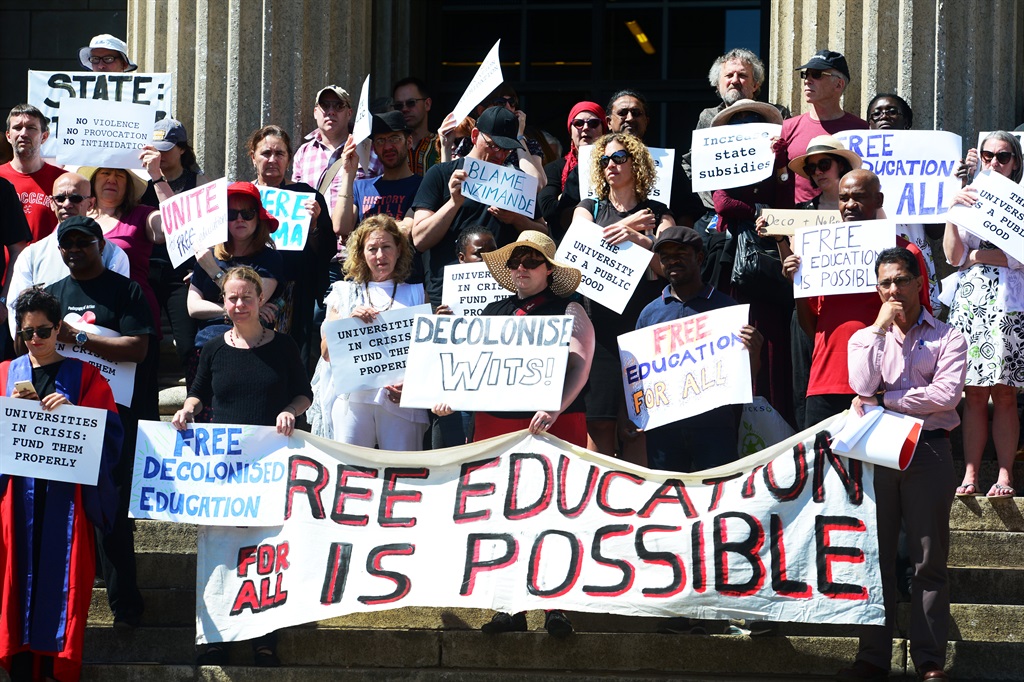
History is littered with countless examples of how the elite hijack working class struggles in order to preserve class and social domination. The Nxasana task team’s proposed Ikusasa Students Financial Aid Programme, mainly comprised of bankers and fellow loan sharks, represents the worst case of divergence between working class students’ demands and private sector’s commercial and social interests.
The ongoing higher education funding crisis presents one of the most urgent threats facing South Africa’s current and future odds at achieving a socially, economically and politically stable society whose people are collectively socially mobile.
Additionally, and quite markedly, it is the legitimacy of the state, as the final authority over policy and practice, as well as the entire political and organisational anatomy of the African National Congress that is particularly under direct threat.
In short, if decisive state intervention does not take place immediately, private sector and financial services interests will effectively subvert both the government and ANC policies in so far as higher education is concerned.
Despite a strong national policy commitment to achieving pro-poor and inclusive patterns of university enrolment, a post-1994 neoliberal approach to education has underpinned the continued commodification of higher education as private good accessible to the wealthy and lucky few, and increasingly inaccessible to the overwhelming majority of “poor and working class” South Africans. It is this view of higher education as a commodity, in a rapidly modernising economy, that laid a solid foundation for the current higher education funding crisis we face today.
Central to the South African higher education funding crisis is a university system that is grossly underfunded, small in size and increasingly sold like a commodity in the market place, with the financial burden increasingly transferred to individual students over the past two decades.
Whilst the negative consequences of this higher education system have been felt across the social spectrum, they have particularly paralysed the educational and social mobility of youth from low income households and communities, permanently condemning millions into the NEET (Not in Employment, Education or Training) cycle of poverty, inequality and unemployment.
By maintaining a hierarchical, unreasonably meritocratic, commodified posture, universities facilitate the occurrence of socially unequal patterns of educational attainment which in turn reproduce structures of socioeconomic domination and inequality, under the hoax of academic neutrality and institutional autonomy.
So what must be done immediately?
1. Change the outdated definition of “poor and working class students” from the outdated R120 000 annual household income to R350 000. Keeping in mind the escalating cost of higher education and training, the current socioeconomic profile of South African households, and in order to achieve maximum developmental impact of our pro-poor higher education policies, it is important for us to redefine who falls within the category of poor and working class.
Despite the cost of studying and living having more than doubled in the past decade alone, the threshold has remained unchanged. In determining the affordability of something as crucial as education, it would be incorrect to assess the value of one’s household income in isolation from the ever-rising cost of university education.
With more than 90% of SA’s households earning less than R350 000, this change will bring much needed relief to the children of 14.8 million unemployed South Africans, 16 million social grant recipients, one million domestic workers, low income earners such as farm workers, mine workers and security guards, as well as entrance level civil servants such as teachers, nurses, social workers, garbage collectors and artisans.
2. The government should as an interim intervention offer fully subsidised free university education, estimated to cost the state between R6.5 billion and R7.5 billion, for new 2017 university entrants coming from a new redefined definition of poor and working class families. This will be a bold step towards resolving the higher education funding crisis while the commission on university fees concludes its work. This group of students must be supported through government higher education grants, not loans.
3. To achieve intended access and success rates, the fully subsidised cost of study must include tuition fees, accommodation, meals, transport and all study material. No poor and working class student must be partially funded.
4. Reject the “Ikusasa Student Financial Aid Programme” – proposed by the new chair of the controversy-hit National Student Financial Aid Scheme, Sizwe Nxasana – as nothing more than a bad attempt at rebranding the limitations of the scheme with a privately run scheme littered with private sector – particularly banking sector – interests, that actually continues on the neoliberal, meritocratic and commodified trajectory of the current model.
5. Informed by the principle of redistributive justice and in pursuit of collective social mobility, I submit that the higher income earners and big businesses that derive their profits and their very existence from the wealth of our nation be taxed sufficiently to fund the education of poor and working class students.
6. The final report of the presidential commission on higher education funding must come up with an inclusive and comprehensive higher education funding model for all undergraduate students, including returning students, which will also mark a decisive and bold step in the country’s efforts to break free from the socioeconomic legacy of colonialism and apartheid while dealing decisively with the triple challenge of poverty, unemployment and inequality. These recommendations should be ready to implement in 2018.
• Mukovhe Masutha is the founder of Thusanani Foundation and the Centre for Emerging Researchers. He is a PhD Student at the International Centre for Higher Education Management, University of Bath. He shared his recommendations and insight at a joint conference held by the University of Stellenbosch Business School and the University of Bath on The role of Business Schools and Higher Education to Inclusive Development.




 Publications
Publications
 Partners
Partners








